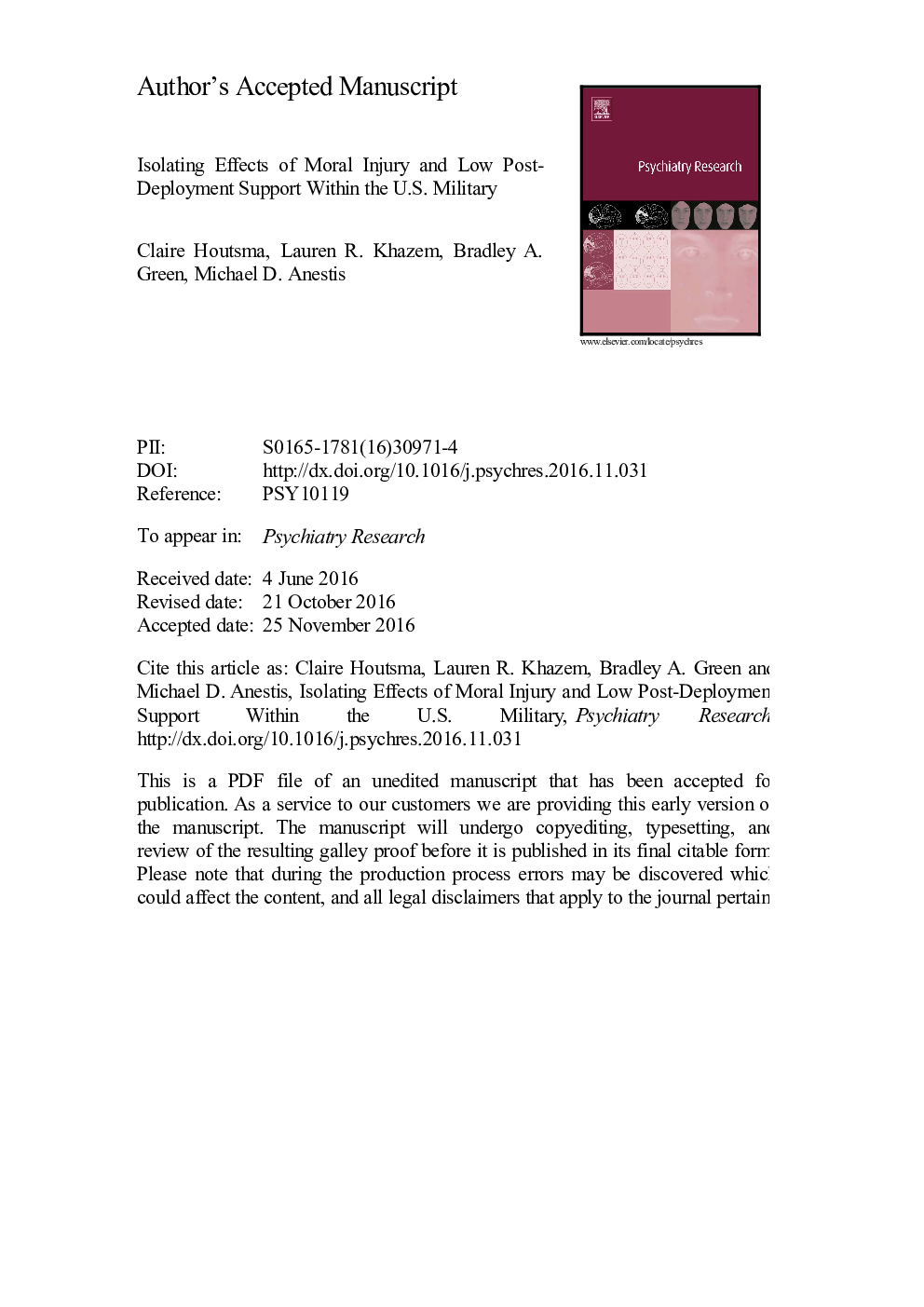| کد مقاله | کد نشریه | سال انتشار | مقاله انگلیسی | نسخه تمام متن |
|---|---|---|---|---|
| 4933659 | 1433799 | 2017 | 23 صفحه PDF | دانلود رایگان |
عنوان انگلیسی مقاله ISI
Isolating effects of moral injury and low post-deployment support within the U.S. military
ترجمه فارسی عنوان
اثرات جداگانه آسیب اخلاقی و حمایت کم پس از استقرار در ارتش ایالات متحده
دانلود مقاله + سفارش ترجمه
دانلود مقاله ISI انگلیسی
رایگان برای ایرانیان
کلمات کلیدی
تعارض متضاد، جنایات دیگر خیانت، خود انتقام، خودکشی کردن،
ترجمه چکیده
نرخ خودکشی در بخش های نظامی ایالات متحده، به ویژه سپاه پاسداران ملی، به طور قابل توجهی بالاتر از میزان خودکشی مردم است. برای درک بهتر و جلوگیری از خودکشی در این جمعیت، ما باید مکانیزم هایی را برای ریسک ایجاد کنیم که این اختلافات را ایجاد می کنند. یکی از عوامل خطر مربوط به خدمات نظامی آسیب اخلاقی است، اصطلاح برای تجربیات که نقض باورهای اخلاقی خود است. با استفاده از یک سری رگرسیون چندگانه سلسله مراتبی، در پژوهش حاضر، نقش مدون حمایت اجتماعی پس از استقرار در رابطه با آسیب های اخلاقی (خودگردان، تجاوز دیگر، خیانت) و وابستگی خنثی در میان پرسنل نظامی مورد بررسی قرار گرفت. نمونه فعلی شامل 552 پرسنل نظامی با حداقل یک استقرار قبلی بود. به طور تقریبی با فرضیه ها، نتایج نشان داد که غلبه های دیگر و خیانت به طور معنی داری با وابستگی متخلخل در سطوح کم، اما نه به طور متوسط و یا بالا از حمایت پس از استقرار ارتباط دارد. در مقابل، تعامل خود گمراهی و پشتیبانی پس از استقرار به طور معناداری با وابستگی خیزشی ارتباط نداشت و اثر اصلی خود انتقام گرایی بر وابستگی خفیف وجود نداشت. این نشان می دهد که تجربیات مربوط به وقایع اخلاقی (و غیره)، تماشای یک سرباز همسایه، که توسط یک رفیق خیانت می شود، تجربه می شود، می تواند با حمایت کم اجتماعی پس از استقرار افزایش یابد، و افزایش خطر تعلق خفیف. پیامدهای پیشگیری و درمان مورد بحث قرار گرفته است.
موضوعات مرتبط
علوم زیستی و بیوفناوری
علم عصب شناسی
روانپزشکی بیولوژیکی
چکیده انگلیسی
Suicide rates within U.S. military components, particularly the National Guard, are significantly higher than the general population suicide rate. To better understand and prevent suicide within this population, we must identify mechanisms of risk contributing to these discrepancies. One risk factor relevant to military service is moral injury, a term for experiences that violate one's moral beliefs. Using a series of hierarchical multiple regressions, the current study examined the moderating role of post-deployment social support on the association between moral injury (self-transgressions, other-transgressions, and betrayal) and thwarted belongingness among military personnel. The current sample was comprised of 552 military personnel with at least one previous deployment. Partially consistent with hypotheses, results revealed that other-transgressions and betrayal were significantly associated with thwarted belongingness at low, but not mean or high levels of post-deployment support. In contrast, the interaction of self-transgressions and post-deployment support was not significantly associated with thwarted belongingness, nor was there a significant main effect of self-transgressions on thwarted belongingness. This suggests that experiencing other-perpetrated morally injurious events (i.e., watching a fellow soldier die, being betrayed by a comrade) can be compounded by low post-deployment social support, increasing risk for thwarted belongingness. Implications for prevention and treatment are discussed.
ناشر
Database: Elsevier - ScienceDirect (ساینس دایرکت)
Journal: Psychiatry Research - Volume 247, January 2017, Pages 194-199
Journal: Psychiatry Research - Volume 247, January 2017, Pages 194-199
نویسندگان
Claire Houtsma, Lauren R. Khazem, Bradley A. Green, Michael D. Anestis,
